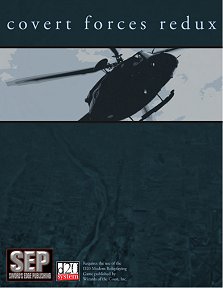
Designed to bring the strange world of covert operations to your game, this work begins by exploring just what is meant by the term - it's more than elite soldiers (although this is the source of many operators), it is more military than spies, yet less military than the regular armed forces. In fact, if you like contempory action in your game, it's ideal - small groups acting independently, with defined yet fluid objectives and the strong likelihood of violence. Likely missions can range from hostage rescue to extended reconnaissance, perhaps ending in an assault on a facility or individual deemed a risk to the characters' employing nation. Missions against terrorists are common, while the specialist skills of your unit might even be called upon to deal with drug dealers, revolutionaries or... well, whoever your government wants taken out of the picture. Chapter 1 explores these and other likely mission types, with plenty of ideas to whet the appetite and enable you to decide if this is the sort of game you'd like to run.
Chapter 2 looks at the sort of specialist training available to special forces operators, and how to express it in game terms. The areas covered are close quarters, combat diving, containment, counter-terrorist assault, freefall, protection detail, recce, and sniper; and several new Talent Trees are presented (some being adapted and enhanced versions of ones from earlier product).
Chapter 3 turns to the real world, and looks at selected covert/special ops organisations from Australia, Canada, the United Kingdom and the United States. Excellent background if your characters are to serve in one of these, or meet up with members of it - and good guidelines if you prefer to invent your own organisation for game purposes. For each organisation there are details of recruitment and training, particular areas of expertise and the weapons and equipment that they prefer.
Chapter 4 delivers much of the same for selected units from around the world - excellent for international flavour or possibly even as opposition. Although superficial - for reasons of space, because they all essentially do the same thing and due to the paucity of publically-available information - you ought to be able to build on this to provide allies/opposition teams or an exotic background for a foreign operator assigned to your team.
Chapter 5: Fluid Situations looks at the various situations - in particular, those involving combat - which a covert operations team might encounter, and how to model them realistically in game terms (such as, which skill checks are most appropriate in a given situation). The classic situations of Ambush, Insertion, Questioning, Snipers and even Training are discussed in considerable detail, including information on the different types of airborne insertion by parachute (and what can go wrong), timings and sequencing in combat and so on, putting all the rules information that you might need to run each encounter in an ordered manner ready to hand.
Next, Chapter 6 presents an array of useful new feats which covert operators will want to acquire; while Chapter 7 looks at equipment that is equally as useful. It's good to see that this covers the gear that makes the operators' life more comfortable and practical, not just a list of weapons. So parachutes, hydration systems and compasses are included. But do not fear, there is plenty of weapons detail to allow each character to pick his preferred loadout. There's also a collection of vehicles - land, air and sea - to get the characters to the action and safely home again. Finally, there's an appendix of useful terminology so everyone can sound the part.
Overall, this is an excellent introduction to running covert operations games. The rules materials - especially those of Chapter 5 - are particularly good, as well as the range of skills, feats and talents which characters can acquire through training and experience. The survey of 'real world' units is of necessity somewhat scanty, understandibly given both that entire books are written about such organisations, and that basic information is not readily available... it is likely best to invent your own unit or do some more research on the one you intend to build your game around. But all the tools are here for you to be able to create a realistic and exciting game.
Return to Covert Forces Redux page.
Reviewed: 11 August 2007

